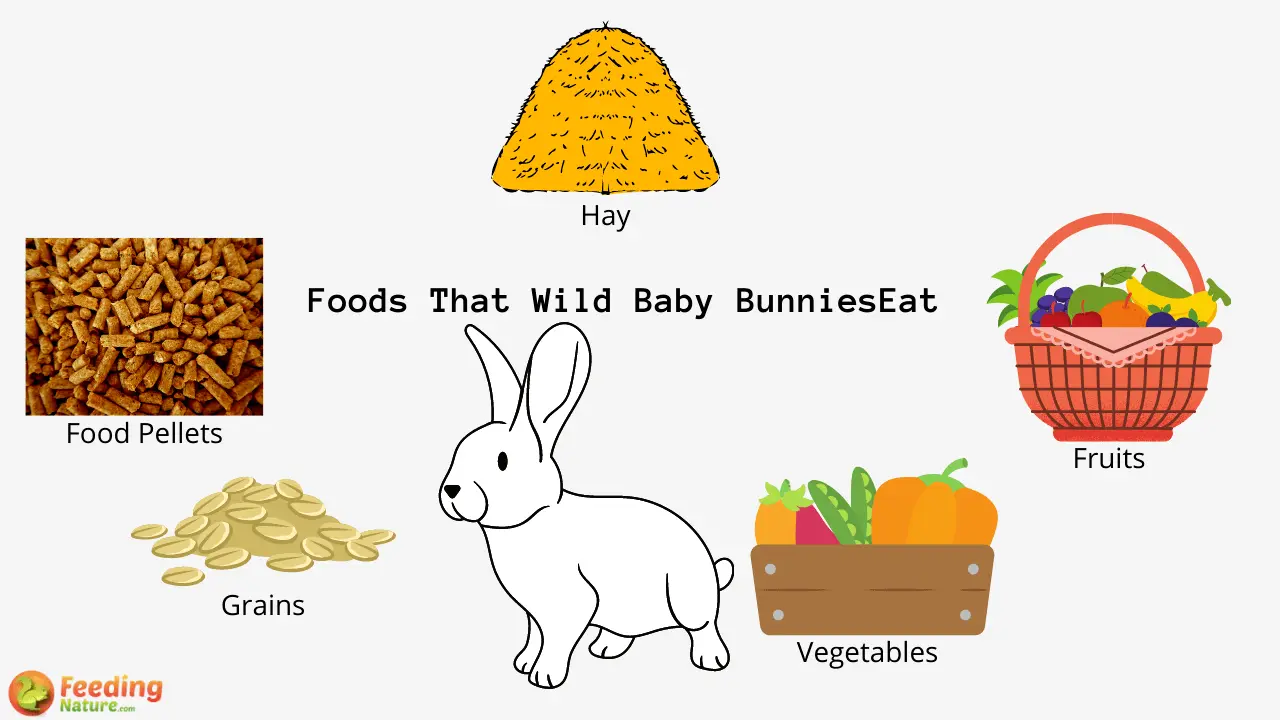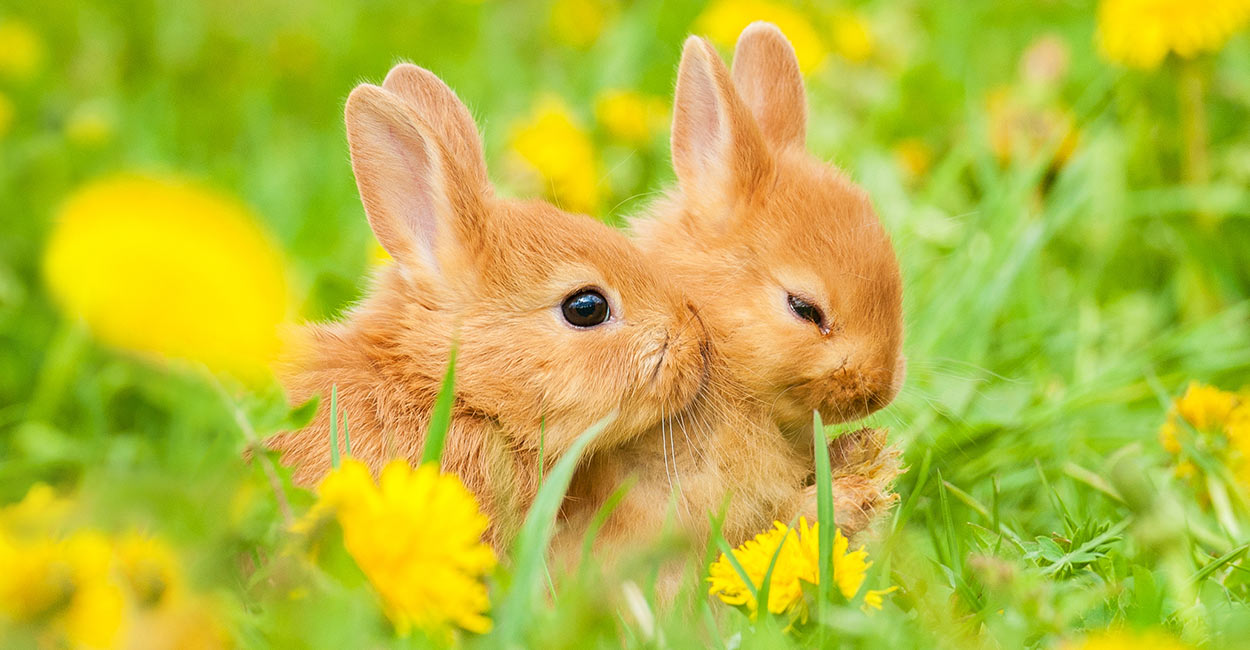If you’re looking for information about what baby bunnies should eat, you’ve come to the right place. This article will provide all the information you need to know about what baby bunnies eat and provide the best nutrition for your furry little friends. From what types of food to feed them to the amount of food they should be given, we’ll cover all the basics of rabbit nutrition. We’ll also talk about the importance of providing plenty of fresh water and hay, as well as the dangers of overfeeding and over-treating your baby bunny. With this information, you can ensure that your baby bunnies get the proper nutrition they need to grow up healthy and strong.
What Baby Bunnies Eat

Two Week Old Rabbits
At two weeks old, baby rabbits are still unable to digest solid food and need to be fed their mother’s milk. They should be fed every 3-4 hours. The milk can be supplemented with a commercial milk replacer specifically designed for rabbits.
Six and Seven Week Old Bunnies
As baby bunnies reach six to seven weeks old, they begin to eat hay and fresh vegetables. Alfalfa hay is high in protein and is best for bunnies under seven weeks old. After seven weeks, they can transition to a diet of timothy hay. Fresh vegetables should be offered to baby bunnies as well as a small amount of pellets.
Five and Ten Week Old Rabbit
At five to ten weeks old, baby rabbits can start to transition to a diet of mostly hay, fresh vegetables, and a small portion of pellets. How do baby rabbits eat? They should be given a variety of vegetables, including dark leafy greens such as kale, parsley, and romaine lettuce. They should also be given small amounts of high-fiber pellets designed for rabbits.
Overall, baby rabbits should be given a diet that is high in fiber and low in fat. This will help ensure that they grow and develop properly.
Weaning Baby Rabbits
At around the two week old mark, baby rabbits can begin to be weaned onto solid food. It is important to introduce solid foods gradually. Start by mixing some of their regular formula with high-quality, pelleted rabbit feed to make a gruel. This should be gradually increased over the next few days, until the bunnies appear to be eating the pellets on their own.
It is important that the pellets are fresh and of good quality, as this will ensure their dietary needs are met. Fresh hay should also be available for the bunnies, as this is a key part of their diet. Leafy greens, such as romaine lettuce, can be added to the mix, but should be offered in small amounts and only once the bunnies are used to eating the pellets.
Once the bunnies are consistently eating the pellets, the formula can be removed from the diet altogether, and the bunnies can be fed a balanced, high-quality pellet diet with fresh hay and leafy greens.
It is important to monitor the bunnies’ weight and overall health during this period to make sure they are getting the right nutrition and growing properly. Any unusual changes should be discussed with a veterinarian.
Frequently Asked Questions
How Much Food Should I Feed My Baby Bunny?
Baby bunnies should be fed a diet of hay, fresh vegetables, and a small amount of pellets. A baby bunny should eat approximately 2 tablespoons of pellets per day, divided into two meals. The hay should be available to the bunny at all times, and the vegetables should be given in small amounts twice a day. As the bunny grows older, the amount of pellets can be increased to a quarter cup per day, divided into two meals. The amount of vegetables should also increase as the bunny gets older.
It is important that baby bunnies are given the right amount of food, as they are growing quickly and need the proper nutrition. An adult bunny’s diet should consist of mostly hay, with a small amount of vegetables and pellets.
Always consult your veterinarian for specific dietary advice for your baby bunny.
What Types of Food are Suitable for Baby Bunnies?
- Hay – Hay should be the main component of a baby rabbit’s diet, and should be made available at all times. Timothy hay is the best choice and is easily available. Avoid alfalfa hay as it is high in calcium, which can lead to bladder stones in adult rabbits.
- Fresh Vegetables – Fresh vegetables should be introduced slowly and in small amounts. Start with dark leafy greens such as kale, parsley, and spinach. As the baby bunny gets older, other vegetables can be added. Carrots, celery, and other root vegetables should be given in moderation.
- Fruit – Fruit should only be given in small amounts as a treat. Apples, bananas, and berries are all suitable for baby bunnies.
- Pellets – Pellets designed specifically for baby rabbits should be given in small amounts. The amount of pellets should gradually increase as the baby bunny grows. Avoid giving adult pellets to baby bunnies.
How often should I feed my baby bunny?
Baby bunnies should have access to fresh hay and water at all times. They should also be given a small portion of pellets once a day. As they get older, they can switch to two or three meals a day. The amount of food should increase as they grow older. Here is a recommended feeding schedule:
- Up to 8 weeks – 1/4 cup of pellets once a day
- 8-12 weeks – 1/2 cup of pellets twice a day
- 12-16 weeks – 3/4 cup of pellets twice a day
- 16 weeks and older – 1 cup of pellets twice a day
It is important to remember that baby bunnies need to be fed a balanced diet that includes hay, fresh vegetables, and a small amount of pellets. If you are unsure if you are feeding your bunny the right thing, talk to your vet.
Is it safe to feed my baby bunny fruits and vegetables?
Yes, you can feed your baby bunny fruits and vegetables, as long as they are given in moderation. Fruits and vegetables should only make up a small portion of your pet rabbit’s diet and should never replace their regular pellets. Here are some tips to ensure your rabbit is getting the right nutrition:
- Choose fresh produce: Feed your rabbit fresh, washed fruits and vegetables. Avoid canned or frozen varieties.
- Introduce gradually: Start by offering small amounts of fruits and vegetables to your bunny and gradually increase the portion size as your pet becomes accustomed to the new food.
- Be wary of sugar content: Fruits containing high sugar content, such as bananas and grapes, should be given in moderation. Avoid feeding your bunny sugary treats, such as candy or chocolate.
- Stick to the basics: Stick to fresh, leafy greens, such as romaine lettuce, parsley, and spinach. Avoid giving your bunny any starchy vegetables, such as potatoes, sweet potatoes, and corn.
It is important to remember that rabbits require a diet that is high in fiber and low in fat. Fruits and vegetables should only make up a small portion of your pet rabbit’s diet and should never replace their regular pellets. If you are unsure about what type of fruits and vegetables are safe for your bunny, it is best to consult your veterinarian.
How can I tell if my baby bunny is getting enough nutrition?
A healthy baby bunny should have a glossy, soft coat, bright eyes, and plenty of energy. You should also be able to feel the ribs, but not see them. If your baby bunny seems lethargic or has dull eyes or coat, it may be lacking in nutrition. Regularly check your baby bunny for signs of poor health and take it to a vet for advice.
Conclusion
Baby bunnies should be fed a diet of hay, fresh vegetables, and a small amount of rabbit-specific pellets. Fresh water should also be available at all times. It is important to provide a nutritionally balanced diet for baby bunnies, as their bodies are still developing. Avoid feeding them human foods, as they can be too fatty or contain too much sugar. With proper nutrition, baby bunnies will grow up to be healthy and happy.
